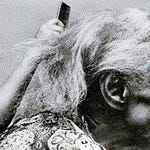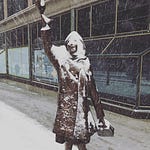The pulmonologist ushered my brother David, my father, and me into a small, sterile consultation room. He brought up Mom’s X-rays on the screen with a few clicks. The stark, clouded condition of her lungs confirmed what we all feared. His words were blunt: she needed a ventilator immediately, or she wouldn’t make it.
Mom went in for back surgery and had been in the hospital a few days before I arrived. David had called me up in Minnesota, his voice tight with urgency. He said there’d been a setback; she was back in the ICU. That morning, before being taken for x-rays, Mom had somehow climbed out of bed and collapsed, sprawled unconscious on the cold floor. When my brother later asked why she hadn’t rung for assistance, she mumbled something about wanting “to fix herself up a bit before she had her picture taken.” She had been trying to reach her makeup kit—groggy, confused, but still determined to look her best for the “camera.” The doctors dismissed it as delirium. But then other complications set in.
As the pulmonologist laid out the case for the ventilator, David and I instinctively turned to our father. He sat expressionless, as if the doctor’s words hadn’t quite reached him. He had been like this ever since I arrived at the hospital—detached, passive, a spectator in his own life. Not that he was withdrawn exactly; it was more like he was watching a story unfold, incapable of shaping it. David, always a man of action, had stepped up to fill the void. Once the commanding presence in any room, my father seemed a minor character, somehow diminished.
That shift had become apparent to me earlier that day. Dad had politely asked a nurse if we could visit Mom in her room. Her response was brusque, almost dismissive. I braced myself for his reaction—he would have put her in her place any other time. But no. He just nodded and stayed quiet. It was David who took charge. He followed the nurse, voice firm, not asking but telling her we would see our mother now.
At that moment, I realized it was the first time I hadn’t seen my dad in control. This was the man who had always commanded every situation, from running a multi-million-dollar corporation to overseeing my tonsillectomy. He never cared how little he knew about a subject—he’d make sure everyone understood he was in charge. Yet now, with Mom’s life in the balance, his authority had evaporated.
David and I agreed with the doctor about the ventilator, but we hadn’t yet spoken to Mom. When we entered her room, she knew what was up. She pushed her oxygen mask aside and rasped a single word: “No.” Her voice was faint, but the force behind it was unmistakable. She straightened her frail body and met our gaze, determined. “I don’t want it,” she said, as firm as ever.
We tried to explain—David, the doctor, even Dad nodding from his place near the door—but she wouldn’t budge. “Everybody I know who goes on one of those things never comes off,” she said, each breath a struggle but her conviction unwavering. “I won’t die like that.” Mom was resolute. She would recover on her terms, and no one—not us, not the doctors, not the machine—was going to take her dignity away even in death.
In that instant, she was the strongest, most decisive I had ever seen her. She was fierce.
And with that clarity came another realization. For years, I had believed Dad was the strong one, the glue holding us together, while Mom floundered, fragile and frivolous. But I was wrong. I had misunderstood the balance of power between them, fallen for the illusion they had carefully maintained.
For fifty years, they had lived out this unspoken contract. My father, raised in a harsh, violent environment, needed control, a way to feel powerful. And my mother, coming from a Depression-era farm family, undernourished and wearing threadbare clothes, craved respect—she wanted to matter. So, they made a deal: she would let him play the part of the commander, feeding his need for authority, and in return, he would treat her with the respect she had always wanted. I suddenly understood why she had fought so hard to get out of bed that morning, delirious as she was. In her mind, it was about her dignity. No one was going to take that from her, not even in her weakest moment.
Once I saw that, other things clicked into place. Mom’s wild, drunken escapades over the years—the incidents where she’d disappear in the car, embarrass us, made a scene—they weren’t just chaotic outbursts. They were strategic. Each one followed an act of disrespect from my father. Whenever he broke their contract, she would show him and everyone else who was really in charge.
Their dynamic, this delicate balance of power and respect, kept them together through everything.
I had only known these two people as parents, which, in the scheme of things, is not knowing somebody much at all.
Mom survived in her own way, without the ventilator, and I was blessed with several more years to be with my parents, to see them through different lenses. I came to know the powerful woman who was my mother and my father, with his hidden fragility. They became people to me, people I was able to love deeply, for who they were.











